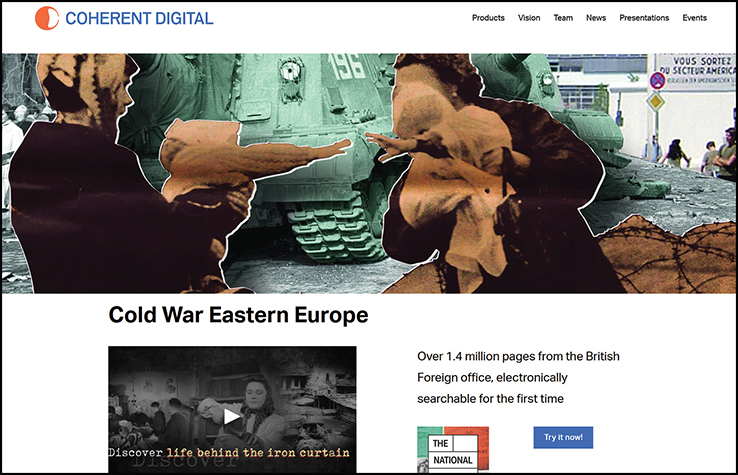Cold War Eastern Europe, 1947–1982 | eReview
This in-depth examination of the history, politics, economics, and social movements in Eastern Europe after World War II through the Cold War is an excellent resource for users interested in the post-Stalin era.
Coherent Digital
CONTENT Previously available through Taylor & Francis, this database is now accessible on Coherent Digital’s History Commons platform. Like the other modules in the History Commons archives (Secret Files from World Wars to Cold War; British Society, 1939–1951; Weimar and Nazi Germany), Cold War Eastern Europe, 1947–1982, features primary documents with significant historical value for researchers and students. This is the largest of the four History Commons modules, with 1.4 million pages of 16,686 declassified documents from three series of British Foreign Office files. Content consists of correspondence, meeting minutes, memoranda, reports, speeches, press releases, legal documents, treaties, official government materials, administrative records, and financial records. Documents are global in nature, with dossiers and folders on events and activities in the United States, Canada, India, China, Japan, Australia, and most European countries, including all countries in the Eastern European Bloc. Key events such as the building of the Berlin Wall, the Cuban Missile Crisis, and the 1980 Moscow Olympics Boycott are fully documented, with the years 1961–1963 most heavily represented.
USABILITY The platform’s emphasis continues to be on simplicity and functionality, with a basic search box, advanced-search options, and tags for retrieving documents by content, document type, source, language, year, and topic. All are purposeful and easy to use. Advanced search narrows word and phrase searches by title, summary, full text, author, date, organization, or organizational type.
Searching is intuitive, with excellent response time and highly relevant results. An advanced search of “dissidents in Poland,” for example, returns eight lengthy annual reports covering the years 1976–1982. If users then select Ukraine from the topics option, they will discover the 1957 report “Soviet Union: Minorities,” highlighting the “success of campaigns for the linguistic and cultural assimilation of non-Russian people, including the rehabilitation of Crimean Tatars, who collaborated with Nazis during the Second World War.” Taken together, the results provide a fascinating snapshot of the world behind the Iron Curtain.
Two new enhancements—keyword context and high-resolution scanning—have improved the user experience. The former highlights search terms in retrieved documents. The latter enables the efficient loading of documents. Learning tools include lesson plans and reports that support teaching and classroom engagement.
PRICING The module is available as a one-time purchase of perpetual rights for academic and research libraries. List price is $90,000, but pricing is scaled to library size and type, ranging from $81,000 for the largest ARL to $41,400 for the smallest institution. Payments can be spread over years. Consortium prices are lower. After one free year, annual service fees range from $350 to $500. One service fee will cover up to six modules on the History Commons platform. Legacy Taylor & Francis customers who did not own this module can purchase it at prorated pricing based on the cost of the entire History Commons set.
VERDICT The documents in this collection provide an in-depth examination of history, politics, economics, and social movements in Eastern Europe after World War II through the Cold War. The archive is not only an excellent complement to the other modules in History Commons but also works well as a stand-alone resource for users interested in the post-Stalin era.
RELATED
ALREADY A SUBSCRIBER? LOG IN
We are currently offering this content for free. Sign up now to activate your personal profile, where you can save articles for future viewing










Add Comment :-
Comment Policy:
Comment should not be empty !!!